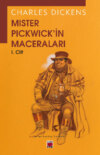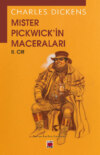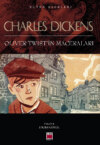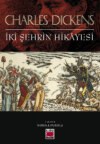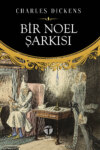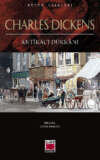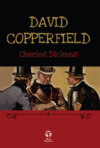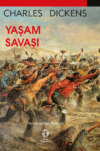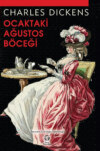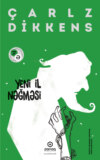Kitabı oku: «Martin Chuzzlewit», sayfa 62
‘What!’ said Mrs Gamp, ‘you bage creetur, have I know’d Mrs Harris five and thirty year, to be told at last that there ain’t no sech a person livin’! Have I stood her friend in all her troubles, great and small, for it to come at last to sech a end as this, which her own sweet picter hanging up afore you all the time, to shame your Bragian words! But well you mayn’t believe there’s no sech a creetur, for she wouldn’t demean herself to look at you, and often has she said, when I have made mention of your name, which, to my sinful sorrow, I have done, “What, Sairey Gamp! debage yourself to her!” Go along with you!’
‘I’m a-goin’, ma’am, ain’t I?’ said Mrs Prig, stopping as she said it.
‘You had better, ma’am,’ said Mrs Gamp.
‘Do you know who you’re talking to, ma’am?’ inquired her visitor.
‘Aperiently,’ said Mrs Gamp, surveying her with scorn from head to foot, ‘to Betsey Prig. Aperiently so. I know her. No one better. Go along with you!’
‘And you was a-goin’ to take me under you!’ cried Mrs Prig, surveying Mrs Gamp from head to foot in her turn. ‘You was, was you? Oh, how kind! Why, deuce take your imperence,’ said Mrs Prig, with a rapid change from banter to ferocity, ‘what do you mean?’
‘Go along with you!’ said Mrs Gamp. ‘I blush for you.’
‘You had better blush a little for yourself, while you are about it!’ said Mrs Prig. ‘You and your Chuffeys! What, the poor old creetur isn’t mad enough, isn’t he? Aha!’
‘He’d very soon be mad enough, if you had anything to do with him,’ said Mrs Gamp.
‘And that’s what I was wanted for, is it?’ cried Mrs Prig, triumphantly. ‘Yes. But you’ll find yourself deceived. I won’t go near him. We shall see how you get on without me. I won’t have nothink to do with him.’
‘You never spoke a truer word than that!’ said Mrs Gamp. ‘Go along with you!’
She was prevented from witnessing the actual retirement of Mrs Prig from the room, notwithstanding the great desire she had expressed to behold it, by that lady, in her angry withdrawal, coming into contact with the bedstead, and bringing down the previously mentioned pippins; three or four of which came rattling on the head of Mrs Gamp so smartly, that when she recovered from this wooden shower-bath, Mrs Prig was gone.
She had the satisfaction, however, of hearing the deep voice of Betsey, proclaiming her injuries and her determination to have nothing to do with Mr Chuffey, down the stairs, and along the passage, and even out in Kingsgate Street. Likewise of seeing in her own apartment, in the place of Mrs Prig, Mr Sweedlepipe and two gentlemen.
‘Why, bless my life!’ exclaimed the little barber, ‘what’s amiss? The noise you ladies have been making, Mrs Gamp! Why, these two gentlemen have been standing on the stairs, outside the door, nearly all the time, trying to make you hear, while you were pelting away, hammer and tongs! It’ll be the death of the little bullfinch in the shop, that draws his own water. In his fright, he’s been a-straining himself all to bits, drawing more water than he could drink in a twelvemonth. He must have thought it was Fire!’
Mrs Gamp had in the meanwhile sunk into her chair, from whence, turning up her overflowing eyes, and clasping her hands, she delivered the following lamentation:
‘Oh, Mr Sweedlepipes, which Mr Westlock also, if my eyes do not deceive, and a friend not havin’ the pleasure of bein’ beknown, wot I have took from Betsey Prig this blessed night, no mortial creetur knows! If she had abuged me, bein’ in liquor, which I thought I smelt her wen she come, but could not so believe, not bein’ used myself’ – Mrs Gamp, by the way, was pretty far gone, and the fragrance of the teapot was strong in the room – ‘I could have bore it with a thankful art. But the words she spoke of Mrs Harris, lambs could not forgive. No, Betsey!’ said Mrs Gamp, in a violent burst of feeling, ‘nor worms forget!’
The little barber scratched his head, and shook it, and looked at the teapot, and gradually got out of the room. John Westlock, taking a chair, sat down on one side of Mrs Gamp. Martin, taking the foot of the bed, supported her on the other.
‘You wonder what we want, I daresay,’ observed John. ‘I’ll tell you presently, when you have recovered. It’s not pressing, for a few minutes or so. How do you find yourself? Better?’
Mrs Gamp shed more tears, shook her head and feebly pronounced Mrs Harris’s name.
‘Have a little – ’ John was at a loss what to call it.
‘Tea,’ suggested Martin.
‘It ain’t tea,’ said Mrs Gamp.
‘Physic of some sort, I suppose,’ cried John. ‘Have a little.’
Mrs Gamp was prevailed upon to take a glassful. ‘On condition,’ she passionately observed, ‘as Betsey never has another stroke of work from me.’
‘Certainly not,’ said John. ‘She shall never help to nurse me.’
‘To think,’ said Mrs Gamp, ‘as she should ever have helped to nuss that friend of yourn, and been so near of hearing things that – Ah!’
John looked at Martin.
‘Yes,’ he said. ‘That was a narrow escape, Mrs Gamp.’
‘Narrer, in-deed!’ she returned. ‘It was only my having the night, and hearin’ of him in his wanderins; and her the day, that saved it. Wot would she have said and done, if she had know’d what I know; that perfeejus wretch! Yet, oh good gracious me!’ cried Mrs Gamp, trampling on the floor, in the absence of Mrs Prig, ‘that I should hear from that same woman’s lips what I have heerd her speak of Mrs Harris!’
‘Never mind,’ said John. ‘You know it is not true.’
‘Isn’t true!’ cried Mrs Gamp. ‘True! Don’t I know as that dear woman is expecting of me at this minnit, Mr Westlock, and is a-lookin’ out of window down the street, with little Tommy Harris in her arms, as calls me his own Gammy, and truly calls, for bless the mottled little legs of that there precious child (like Canterbury Brawn his own dear father says, which so they are) his own I have been, ever since I found him, Mr Westlock, with his small red worsted shoe a-gurglin’ in his throat, where he had put it in his play, a chick, wile they was leavin’ of him on the floor a-lookin’ for it through the ouse and him a-choakin’ sweetly in the parlour! Oh, Betsey Prig, what wickedness you’ve showed this night, but never shall you darken Sairey’s doors agen, you twining serpiant!’
‘You were always so kind to her, too!’ said John, consolingly.
‘That’s the cutting part. That’s where it hurts me, Mr Westlock,’ Mrs Gamp replied; holding out her glass unconsciously, while Martin filled it.
‘Chosen to help you with Mr Lewsome!’ said John. ‘Chosen to help you with Mr Chuffey!’
‘Chose once, but chose no more,’ cried Mrs Gamp. ‘No pardnership with Betsey Prig agen, sir!’
‘No, no,’ said John. ‘That would never do.’
‘I don’t know as it ever would have done, sir,’ Mrs Gamp replied, with a solemnity peculiar to a certain stage of intoxication. ‘Now that the marks,’ by which Mrs Gamp is supposed to have meant mask, ‘is off that creetur’s face, I do not think it ever would have done. There are reagions in families for keeping things a secret, Mr Westlock, and havin’ only them about you as you knows you can repoge in. Who could repoge in Betsey Prig, arter her words of Mrs Harris, setting in that chair afore my eyes!’
‘Quite true,’ said John; ‘quite. I hope you have time to find another assistant, Mrs Gamp?’
Between her indignation and the teapot, her powers of comprehending what was said to her began to fail. She looked at John with tearful eyes, and murmuring the well-remembered name which Mrs Prig had challenged – as if it were a talisman against all earthly sorrows – seemed to wander in her mind.
‘I hope,’ repeated John, ‘that you have time to find another assistant?’
‘Which short it is, indeed,’ cried Mrs Gamp, turning up her languid eyes, and clasping Mr Westlock’s wrist with matronly affection. ‘To-morrow evenin’, sir, I waits upon his friends. Mr Chuzzlewit apinted it from nine to ten.’
‘From nine to ten,’ said John, with a significant glance at Martin. ‘and then Mr Chuffey retires into safe keeping, does he?’
‘He needs to be kep safe, I do assure you,’ Mrs Gamp replied with a mysterious air. ‘Other people besides me has had a happy deliverance from Betsey Prig. I little know’d that woman. She’d have let it out!’
‘Let him out, you mean,’ said John.
‘Do I!’ retorted Mrs Gamp. ‘Oh!’
The severely ironical character of this reply was strengthened by a very slow nod, and a still slower drawing down of the corners of Mrs Gamp’s mouth. She added with extreme stateliness of manner after indulging in a short doze:
‘But I am a-keepin’ of you gentlemen, and time is precious.’
Mingling with that delusion of the teapot which inspired her with the belief that they wanted her to go somewhere immediately, a shrewd avoidance of any further reference to the topics into which she had lately strayed, Mrs Gamp rose; and putting away the teapot in its accustomed place, and locking the cupboard with much gravity proceeded to attire herself for a professional visit.
This preparation was easily made, as it required nothing more than the snuffy black bonnet, the snuffy black shawl, the pattens and the indispensable umbrella, without which neither a lying-in nor a laying-out could by any possibility be attempted. When Mrs Gamp had invested herself with these appendages she returned to her chair, and sitting down again, declared herself quite ready.
‘It’s a ‘appiness to know as one can benefit the poor sweet creetur,’ she observed, ‘I’m sure. It isn’t all as can. The torters Betsey Prig inflicts is frightful!’
Closing her eyes as she made this remark, in the acuteness of her commiseration for Betsey’s patients, she forgot to open them again until she dropped a patten. Her nap was also broken at intervals like the fabled slumbers of Friar Bacon, by the dropping of the other patten, and of the umbrella. But when she had got rid of those incumbrances, her sleep was peaceful.
The two young men looked at each other, ludicrously enough; and Martin, stifling his disposition to laugh, whispered in John Westlock’s ear,
‘What shall we do now?’
‘Stay here,’ he replied.
Mrs Gamp was heard to murmur ‘Mrs Harris’ in her sleep.
‘Rely upon it,’ whispered John, looking cautiously towards her, ‘that you shall question this old clerk, though you go as Mrs Harris herself. We know quite enough to carry her our own way now, at all events; thanks to this quarrel, which confirms the old saying that when rogues fall out, honest people get what they want. Let Jonas Chuzzlewit look to himself; and let her sleep as long as she likes. We shall gain our end in good time.’
CHAPTER FIFTY
SURPRISES TOM PINCH VERY MUCH, AND SHOWS HOW CERTAIN CONFIDENCES PASSED BETWEEN HIM AND HIS SISTER
It was the next evening; and Tom and his sister were sitting together before tea, talking, in their usual quiet way, about a great many things, but not at all about Lewsome’s story or anything connected with it; for John Westlock – really John, for so young a man, was one of the most considerate fellows in the world – had particularly advised Tom not to mention it to his sister just yet, in case it should disquiet her. ‘And I wouldn’t, Tom,’ he said, with a little hesitation, ‘I wouldn’t have a shadow on her happy face, or an uneasy thought in her gentle heart, for all the wealth and honours of the universe!’ Really John was uncommonly kind; extraordinarily kind. If he had been her father, Tom said, he could not have taken a greater interest in her.
But although Tom and his sister were extremely conversational, they were less lively, and less cheerful, than usual. Tom had no idea that this originated with Ruth, but took it for granted that he was rather dull himself. In truth he was; for the lightest cloud upon the Heaven of her quiet mind, cast its shadow upon Tom.
And there was a cloud on little Ruth that evening. Yes, indeed. When Tom was looking in another direction, her bright eyes, stealing on towards his face, would sparkle still more brightly than their custom was, and then grow dim. When Tom was silent, looking out upon the summer weather, she would sometimes make a hasty movement, as if she were about to throw herself upon his neck; then check the impulse, and when he looked round, show a laughing face, and speak to him very merrily; when she had anything to give Tom, or had any excuse for coming near him, she would flutter about him, and lay her bashful hand upon his shoulder, and not be willing to withdraw it; and would show by all such means that there was something on her heart which in her great love she longed to say to him, but had not the courage to utter.
So they were sitting, she with her work before her, but not working, and Tom with his book beside him, but not reading, when Martin knocked at the door. Anticipating who it was, Tom went to open it; and he and Martin came back into the room together. Tom looked surprised, for in answer to his cordial greeting Martin had hardly spoken a word.
Ruth also saw that there was something strange in the manner of their visitor, and raised her eyes inquiringly to Tom’s face, as if she were seeking an explanation there. Tom shook his head, and made the same mute appeal to Martin.
Martin did not sit down but walked up to the window, and stood there looking out. He turned round after a few moments to speak, but hastily averted his head again, without doing so.
‘What has happened, Martin?’ Tom anxiously inquired. ‘My dear fellow, what bad news do you bring?’
‘Oh, Tom!’ replied Martin, in a tone of deep reproach. ‘To hear you feign that interest in anything that happens to me, hurts me even more than your ungenerous dealing.’
‘My ungenerous dealing! Martin! My – ’ Tom could say no more.
‘How could you, Tom, how could you suffer me to thank you so fervently and sincerely for your friendship; and not tell me, like a man, that you had deserted me! Was it true, Tom! Was it honest! Was it worthy of what you used to be – of what I am sure you used to be – to tempt me, when you had turned against me, into pouring out my heart! Oh, Tom!’
His tone was one of such strong injury and yet of so much grief for the loss of a friend he had trusted in – it expressed such high past love for Tom, and so much sorrow and compassion for his supposed unworthiness – that Tom, for a moment, put his hand before his face, and had no more power of justifying himself, than if he had been a monster of deceit and falsehood.
‘I protest, as I must die,’ said Martin, ‘that I grieve over the loss of what I thought you; and have no anger in the recollection of my own injuries. It is only at such a time, and after such a discovery, that we know the full measure of our old regard for the subject of it. I swear, little as I showed it – little as I know I showed it – that when I had the least consideration for you, Tom, I loved you like a brother.’
Tom was composed by this time, and might have been the Spirit of Truth, in a homely dress – it very often wears a homely dress, thank God! – when he replied to him.
‘Martin,’ he said, ‘I don’t know what is in your mind, or who has abused it, or by what extraordinary means. But the means are false. There is no truth whatever in the impression under which you labour. It is a delusion from first to last; and I warn you that you will deeply regret the wrong you do me. I can honestly say that I have been true to you, and to myself. You will be very sorry for this. Indeed, you will be very sorry for it, Martin.’
‘I am sorry,’ returned Martin, shaking his head. ‘I think I never knew what it was to be sorry in my heart, until now.’
‘At least,’ said Tom, ‘if I had always been what you charge me with being now, and had never had a place in your regard, but had always been despised by you, and had always deserved it, you should tell me in what you have found me to be treacherous; and on what grounds you proceed. I do not intreat you, therefore, to give me that satisfaction as a favour, Martin, but I ask it of you as a right.’
‘My own eyes are my witnesses,’ returned Martin. ‘Am I to believe them?’
‘No,’ said Tom, calmly. ‘Not if they accuse me.’
‘Your own words. Your own manner,’ pursued Martin. ‘Am I to believe them?’
‘No,’ replied Tom, calmly. ‘Not if they accuse me. But they never have accused me. Whoever has perverted them to such a purpose, has wronged me almost as cruelly’ – his calmness rather failed him here – ‘as you have done.’
‘I came here,’ said Martin; ‘and I appeal to your good sister to hear me – ’
‘Not to her,’ interrupted Tom. ‘Pray, do not appeal to her. She will never believe you.’
He drew her arm through his own, as he said it.
‘I believe it, Tom!’
‘No, no,’ cried Tom, ‘of course not. I said so. Why, tut, tut, tut. What a silly little thing you are!’
‘I never meant,’ said Martin, hastily, ‘to appeal to you against your brother. Do not think me so unmanly and unkind. I merely appealed to you to hear my declaration, that I came here for no purpose of reproach – I have not one reproach to vent – but in deep regret. You could not know in what bitterness of regret, unless you knew how often I have thought of Tom; how long in almost hopeless circumstances, I have looked forward to the better estimation of his friendship; and how steadfastly I have believed and trusted in him.’
‘Tut, tut,’ said Tom, stopping her as she was about to speak. ‘He is mistaken. He is deceived. Why should you mind? He is sure to be set right at last.’
‘Heaven bless the day that sets me right!’ cried Martin, ‘if it could ever come!’
‘Amen!’ said Tom. ‘And it will!’
Martin paused, and then said in a still milder voice:
‘You have chosen for yourself, Tom, and will be relieved by our parting. It is not an angry one. There is no anger on my side – ’
‘There is none on mine,’ said Tom.
‘ – It is merely what you have brought about, and worked to bring about. I say again, you have chosen for yourself. You have made the choice that might have been expected in most people situated as you are, but which I did not expect in you. For that, perhaps, I should blame my own judgment more than you. There is wealth and favour worth having, on one side; and there is the worthless friendship of an abandoned, struggling fellow, on the other. You were free to make your election, and you made it; and the choice was not difficult. But those who have not the courage to resist such temptations, should have the courage to avow what they have yielded to them; and I do blame you for this, Tom: that you received me with a show of warmth, encouraged me to be frank and plain-spoken, tempted me to confide in you, and professed that you were able to be mine; when you had sold yourself to others. I do not believe,’ said Martin, with emotion – ‘hear me say it from my heart – I cannot believe, Tom, now that I am standing face to face with you, that it would have been in your nature to do me any serious harm, even though I had not discovered, by chance, in whose employment you were. But I should have encumbered you; I should have led you into more double-dealing; I should have hazarded your retaining the favour for which you have paid so high a price, bartering away your former self; and it is best for both of us that I have found out what you so much desired to keep secret.’
‘Be just,’ said Tom; who, had not removed his mild gaze from Martin’s face since the commencement of this last address; ‘be just even in your injustice, Martin. You forget. You have not yet told me what your accusation is!’
‘Why should I?’ returned Martin, waving his hand, and moving towards the door. ‘You could not know it the better for my dwelling on it, and though it would be really none the worse, it might seem to me to be. No, Tom. Bygones shall be bygones between us. I can take leave of you at this moment, and in this place – in which you are so amiable and so good – as heartily, if not as cheerfully, as ever I have done since we first met. All good go with you, Tom! – I – ’
‘You leave me so? You can leave me so, can you?’ said Tom.
‘I – you – you have chosen for yourself, Tom! I – I hope it was a rash choice,’ Martin faltered. ‘I think it was. I am sure it was! Good-bye!’
And he was gone.
Tom led his little sister to her chair, and sat down in his own. He took his book, and read, or seemed to read. Presently he said aloud, turning a leaf as he spoke: ‘He will be very sorry for this.’ And a tear stole down his face, and dropped upon the page.
Ruth nestled down beside him on her knees, and clasped her arms about his neck.
‘No, Tom! No, no! Be comforted! Dear Tom!’
‘I am quite – comforted,’ said Tom. ‘It will be set right.’
‘Such a cruel, bad return!’ cried Ruth.
‘No, no,’ said Tom. ‘He believes it. I cannot imagine why. But it will be set right.’
More closely yet, she nestled down about him; and wept as if her heart would break.
‘Don’t. Don’t,’ said Tom. ‘Why do you hide your face, my dear!’
Then in a burst of tears, it all broke out at last.
‘Oh Tom, dear Tom, I know your secret heart. I have found it out; you couldn’t hide the truth from me. Why didn’t you tell me? I am sure I could have made you happier, if you had! You love her, Tom, so dearly!’
Tom made a motion with his hand as if he would have put his sister hurriedly away; but it clasped upon hers, and all his little history was written in the action. All its pathetic eloquence was in the silent touch.
‘In spite of that,’ said Ruth, ‘you have been so faithful and so good, dear; in spite of that, you have been so true and self-denying, and have struggled with yourself; in spite of that, you have been so gentle, and so kind, and even-tempered, that I have never seen you give a hasty look, or heard you say one irritable word. In spite of all, you have been so cruelly mistaken. Oh Tom, dear Tom, will this be set right too! Will it, Tom? Will you always have this sorrow in your breast; you who deserve to be so happy; or is there any hope?’
And still she hid her face from Tom, and clasped him round the neck, and wept for him, and poured out all her woman’s heart and soul in the relief and pain of this disclosure.
It was not very long before she and Tom were sitting side by side, and she was looking with an earnest quietness in Tom’s face. Then Tom spoke to her thus, cheerily, though gravely:
‘I am very glad, my dear, that this has passed between us. Not because it assures me of your tender affection (for I was well assured of that before), but because it relieves my mind of a great weight.’
Tom’s eyes glistened when he spoke of her affection; and he kissed her on the cheek.
‘My dear girl,’ said Tom; ‘with whatever feeling I regard her’ – they seemed to avoid the name by mutual consent – ‘I have long ago – I am sure I may say from the very first – looked upon it as a dream. As something that might possibly have happened under very different circumstances, but which can never be. Now, tell me. What would you have set right?’
She gave Tom such a significant little look, that he was obliged to take it for an answer whether he would or no; and to go on.
‘By her own choice and free consent, my love, she is betrothed to Martin; and was, long before either of them knew of my existence. You would have her betrothed to me?’
‘Yes,’ she said directly.
‘Yes,’ rejoined Tom, ‘but that might be setting it wrong, instead of right. Do you think,’ said Tom, with a grave smile, ‘that even if she had never seen him, it is very likely she would have fallen in love with Me?’
‘Why not, dear Tom?’
Tom shook his head, and smiled again.
‘You think of me, Ruth,’ said Tom, ‘and it is very natural that you should, as if I were a character in a book; and you make it a sort of poetical justice that I should, by some impossible means or other, come, at last, to marry the person I love. But there is a much higher justice than poetical justice, my dear, and it does not order events upon the same principle. Accordingly, people who read about heroes in books, and choose to make heroes of themselves out of books, consider it a very fine thing to be discontented and gloomy, and misanthropical, and perhaps a little blasphemous, because they cannot have everything ordered for their individual accommodation. Would you like me to become one of that sort of people?’
‘No, Tom. But still I know,’ she added timidly, ‘that this is a sorrow to you in your own better way.’
Tom thought of disputing the position. But it would have been mere folly, and he gave it up.
‘My dear,’ said Tom, ‘I will repay your affection with the Truth and all the Truth. It is a sorrow to me. I have proved it to be so sometimes, though I have always striven against it. But somebody who is precious to you may die, and you may dream that you are in heaven with the departed spirit, and you may find it a sorrow to wake to the life on earth, which is no harder to be borne than when you fell asleep. It is sorrowful to me to contemplate my dream which I always knew was a dream, even when it first presented itself; but the realities about me are not to blame. They are the same as they were. My sister, my sweet companion, who makes this place so dear, is she less devoted to me, Ruth, than she would have been, if this vision had never troubled me? My old friend John, who might so easily have treated me with coldness and neglect, is he less cordial to me? The world about me, is there less good in that? Are my words to be harsh and my looks to be sour, and is my heart to grow cold, because there has fallen in my way a good and beautiful creature, who but for the selfish regret that I cannot call her my own, would, like all other good and beautiful creatures, make me happier and better! No, my dear sister. No,’ said Tom stoutly. ‘Remembering all my means of happiness, I hardly dare to call this lurking something a sorrow; but whatever name it may justly bear, I thank Heaven that it renders me more sensible of affection and attachment, and softens me in fifty ways. Not less happy. Not less happy, Ruth!’
She could not speak to him, but she loved him, as he well deserved. Even as he deserved, she loved him.
‘She will open Martin’s eyes,’ said Tom, with a glow of pride, ‘and that (which is indeed wrong) will be set right. Nothing will persuade her, I know, that I have betrayed him. It will be set right through her, and he will be very sorry for it. Our secret, Ruth, is our own, and lives and dies with us. I don’t believe I ever could have told it you,’ said Tom, with a smile, ‘but how glad I am to think you have found it out!’
They had never taken such a pleasant walk as they took that night. Tom told her all so freely and so simply, and was so desirous to return her tenderness with his fullest confidence, that they prolonged it far beyond their usual hour, and sat up late when they came home. And when they parted for the night there was such a tranquil, beautiful expression in Tom’s face, that she could not bear to shut it out, but going back on tiptoe to his chamber-door, looked in and stood there till he saw her, and then embracing him again, withdrew. And in her prayers and in her sleep – good times to be remembered with such fervour, Tom! – his name was uppermost.
When he was left alone, Tom pondered very much on this discovery of hers, and greatly wondered what had led her to it. ‘Because,’ thought Tom, ‘I have been so very careful. It was foolish and unnecessary in me, as I clearly see now, when I am so relieved by her knowing it; but I have been so very careful to conceal it from her. Of course I knew that she was intelligent and quick, and for that reason was more upon my guard; but I was not in the least prepared for this. I am sure her discovery has been sudden too. Dear me!’ said Tom. ‘It’s a most singular instance of penetration!’
Tom could not get it out of his head. There it was, when his head was on his pillow.
‘How she trembled when she began to tell me she knew it!’ thought Tom, recalling all the little incidents and circumstances; ‘and how her face flushed! But that was natural! Oh, quite natural! That needs no accounting for.’
Tom little thought how natural it was. Tom little knew that there was that in Ruth’s own heart, but newly set there, which had helped her to the reading of his mystery. Ah, Tom! He didn’t understand the whispers of the Temple Fountain, though he passed it every day.
Who so lively and cheerful as busy Ruth next morning! Her early tap at Tom’s door, and her light foot outside, would have been music to him though she had not spoken. But she said it was the brightest morning ever seen; and so it was; and if it had been otherwise, she would have made it so to Tom.
She was ready with his neat breakfast when he went downstairs, and had her bonnet ready for the early walk, and was so full of news, that Tom was lost in wonder. She might have been up all night, collecting it for his entertainment. There was Mr Nadgett not come home yet, and there was bread down a penny a loaf, and there was twice as much strength in this tea as in the last, and the milk-woman’s husband had come out of the hospital cured, and the curly-headed child over the way had been lost all yesterday, and she was going to make all sorts of preserves in a desperate hurry, and there happened to be a saucepan in the house which was the very saucepan for the purpose; and she knew all about the last book Tom had brought home, all through, though it was a teaser to read; and she had so much to tell him that she had finished breakfast first. Then she had her little bonnet on, and the tea and sugar locked up, and the keys in her reticule, and the flower, as usual, in Tom’s coat, and was in all respects quite ready to accompany him, before Tom knew she had begun to prepare. And in short, as Tom said, with a confidence in his own assertion which amounted to a defiance of the public in general, there never was such a little woman.
She made Tom talkative. It was impossible to resist her. She put such enticing questions to him; about books, and about dates of churches, and about organs and about the Temple, and about all kinds of things. Indeed, she lightened the way (and Tom’s heart with it) to that degree, that the Temple looked quite blank and solitary when he parted from her at the gate.

